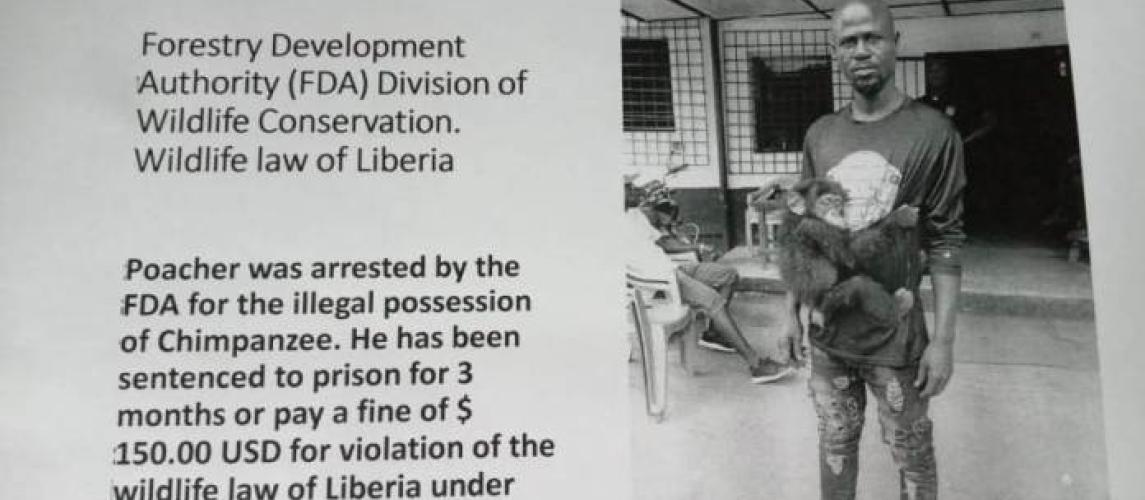
Man Arrested, Prosecuted For Illegal Possession of Chimpanzee -Gets three months jail sentence in Grand Gedeh
The Grand Gedeh City Magisterial Court has sentenced one Stephen Barlee to prison for three months for economic sabotage and illegal possession of a chimpanzee thereby contravening the Wildlife Conservation and Protected Area Management Law of Liberia. The arrest and subsequent prosecution of Stephen Barlee comes in the wake of the unwavering move by the Forestry Development Authority (FDA) and other conservation partners to ensure that the law that protects wildlife against willful abuse by poachers remains decisive and categorical in all respects.
On Monday, August 12, 2019, vigilant rangers of the Forestry Development Authority arrested Stephen Barlee with a baby chimp around the Grebo Krahn National Park while attempting to sell it. Chapter 11, Section 11.2 of the Wildlife Conservation and Protected Area Management Law emphatically forbids the hunting, killing, eating, selling, or possession of wild animals including chimpanzees.
The suspect was then taken to court, charged and convicted. He is currently serving a 90-day jail sentence in Grand Gedeh prison, in the South East. The chimpanzee has since been escorted to safety by the Grebo/Krahn Chief Park Warden,NP Joseph Greene assisted by the Wild Chimpanzee Foundation’s field team assigned in Grand Gedeh. The chimpanzee will receive lifetime care from FDA partner, Liberia Chimpanzee Rescue & Protection (LCRP) which is leaving no stone unturned in making sure that the law is duly implemented to save the lives of wildlife.
It can be recalled that on May 21, 2019, the Cestos City Magisterial Court in River Cess County fined one Comfort Walker USD$100.00 (one hundred dollars) for illegally possessing wildlife (chimpanzee). The chimp was confiscated by the Liberia National Police assigned at the ITI checkpoint in Rivercess County on March 3, 2019 and subsequently turned over the FDA and LCRP.
The FDA, in her complaint filed before the court alleged that the act of defendant Comfort Walker was unlawful, criminal, wicked, wrongful, intentional and malicious which contravened section 11.1g ( illegal possession of wildlife – chimp) which falls under the National Wildlife Conservation and Protected Area Management Law of Liberia. The defendant pleaded guilty to the charges in open court void of argument and made an initial payment of LD$10,000 (ten thousand dollars).
West African chimpanzees are a critically endangered species putting them at risk of extinction. It is extremely important to note that for every young chimpanzee being sold an estimated 5-10 adult chimpanzees have also been killed. This criminal activity is decimating Liberia’s wild populations at an alarming rate. Known as “Gardeners of the Forest” chimpanzees protect our survival and act as a keystone species for all wildlife.
The move by FDA and its partners is viewed as a major success in their drive to effectively promote public awareness regarding Liberia’s Wildlife Conservation and Protected Area Management law and combatting illegal wildlife crime throughout the country and the region. Lead organizations partnering with the FDA in implementation of national and international wildlife crime initiatives include the Wild Chimpanzee Foundation, Fauna and Flora International, Liberia Chimpanzee & Protection and others thanks to the generous support of donors such as the European Union, USAID funded West Africa Biodiversity and Climate Change program and the government of the United Kingdom.
These critical programs focus on a holistic approach to combatting crimes against wildlife and nature through increased public awareness, strengthened law enforcement, training and capacity building and greater involvement of local community members in the responsible and sustainable management of natural resources.
The continued success of operations like this are key to the protection and conservation of Liberia’s unique and important biodiversity for generations to come.
